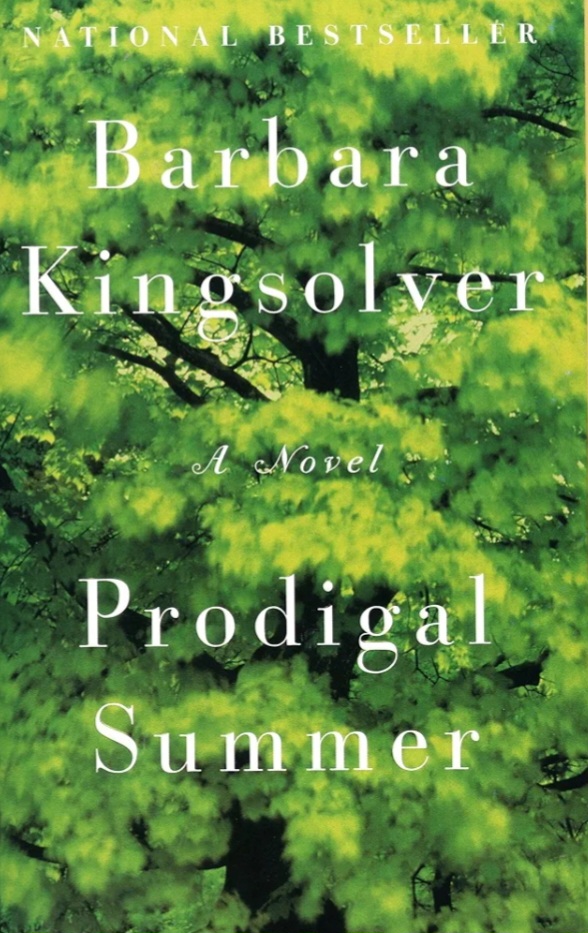Barbara Kingsolver’s Prodigal Summer is a lush, evocative novel that seamlessly intertwines ecology, human connection, and personal transformation. Set in southern Appalachia, this literary work is a powerful testament to Kingsolver’s dual identity as both a writer and a trained biologist. Rich with environmental insight and lyrical prose, Prodigal Summer remains one of the most impactful eco-fiction novels of the 21st century.
Barbara Kingsolver: Author and Environmental Advocate
Barbara Kingsolver has long been celebrated for her literary contributions that merge storytelling with science and activism. With a background in biology and ecology, her works often explore the deep interdependence between humans and the natural world. Books like The Poisonwood Bible, Animal, Vegetable, Miracle, and Flight Behavior all carry this hallmark. However, Prodigal Summer, published in 2000, stands out as her most nature-centric novel, a narrative deeply rooted in ecological principles and rural life.
Kingsolver’s passion for sustainability, biodiversity, and rural livelihoods isn’t just thematic—it's personal. She lives on a farm in Virginia, practices sustainable agriculture, and often draws upon her own experiences and values to shape her characters and settings. In Prodigal Summer, this authenticity is palpable.
Plot Overview: Interconnected Lives and Landscapes
Prodigal Summer weaves together three parallel storylines that are intricately connected through themes of nature, love, and resilience. The novel takes place over one summer in the Appalachian mountains of southern Appalachia—a region Kingsolver clearly knows and reveres.
The first thread follows Deanna Wolfe, a solitary wildlife biologist living in the mountains, studying coyotes. Fiercely independent and protective of the wilderness, Deanna’s life is transformed when she encounters a hunter named Eddie Bondo. Their dynamic becomes a meditation on wilderness, control, and the primal nature of attraction.
The second storyline centers around Lusa Landowski, a city-bred entomologist who has married into a family of tobacco farmers. When tragedy strikes, Lusa must confront grief and cultural dissonance while trying to carve a sustainable life from an unfamiliar rural world. Her journey becomes one of adaptation, regeneration, and female strength.
The third narrative involves two elderly neighbors, Garnett Walker and Nannie Rawley, whose long-standing feud over organic farming and tree conservation mirrors the tension between tradition and environmental stewardship. Their witty, combative exchanges offer both levity and a subtle exploration of generational change and ecological responsibility.
Themes: Ecology, Fertility, and Rewilding
The word “prodigal” in the title is key. It refers not just to the biblical parable of return and forgiveness, but also to the lush, unchecked vitality of summer and nature’s ability to regenerate. The novel is filled with symbols of fertility—of land, wildlife, and human connection. Kingsolver masterfully uses the changing seasons to symbolize internal transformation.
Ecology is not merely a backdrop in this novel—it’s a living force. The biological insights are detailed and accurate, from the mating patterns of moths to the territorial instincts of coyotes. Through her characters, Kingsolver teaches readers about the interconnectedness of species, the fragility of ecosystems, and the urgent need for biodiversity conservation.
Sustainability is another central concern. Whether it’s Lusa’s attempt to create an organic farm or Nannie’s defense of heirloom apple trees, the novel underscores the importance of ecological balance and local resilience in agriculture. In an age of climate change and monoculture, Prodigal Summer serves as a poetic call for environmental awareness and regenerative practices.
Character Development and Emotional Depth
Kingsolver’s characters are deeply human, flawed, and richly drawn. Each protagonist undergoes a profound personal evolution that mirrors the natural cycles unfolding around them. Deanna, once closed off and misanthropic, opens herself to intimacy. Lusa, initially overwhelmed and alienated, discovers strength and belonging in unexpected places. Garnett and Nannie, stubborn and opinionated, begin to soften as they grudgingly recognize the value in each other’s worldview.
This emotional depth is what makes Prodigal Summer more than a novel about nature—it is a novel about our nature. How we grieve, heal, adapt, and grow. How our inner landscapes are often shaped by the physical ones we inhabit.
Writing Style and Literary Merit
Kingsolver’s prose is poetic yet precise. Her sentences ripple with sensory detail, evoking the sights, sounds, and smells of Appalachian wilderness. She doesn’t shy away from scientific terminology, but integrates it seamlessly into the narrative, educating without preaching.
Her use of alternating perspectives adds richness to the novel, allowing readers to see the same environment through different emotional and intellectual lenses. This narrative structure reinforces the novel’s central message: everything is connected.
Prodigal Summer in Today’s World
In the context of today’s environmental challenges, Prodigal Summer feels even more relevant than when it was first published. Issues like habitat loss, sustainable agriculture, and climate change have only grown more urgent. This novel serves as a gentle but powerful reminder that our survival is intricately linked to the ecosystems we often take for granted.
As climate fiction—or “cli-fi”—gains popularity, Kingsolver’s work stands as a pioneer in the genre. Unlike dystopian tales that envision environmental collapse, Prodigal Summer imagines a more hopeful world, one where healing and harmony are still possible if we choose to live more consciously and compassionately.
Conclusion
Prodigal Summer by Barbara Kingsolver is a beautifully written eco-literary novel that celebrates the vitality of life in all its forms. Through interwoven stories of love, grief, and ecological awareness, Kingsolver offers readers a profound meditation on the natural world and our place within it.
For readers seeking an environmentally focused novel that combines scientific insight with emotional resonance, Prodigal Summer is an essential read. It not only entertains but enlightens, leaving a lasting impression on anyone who cares about the earth, biodiversity, and the intricate dance of life that connects us all.
Keywords: Barbara Kingsolver, Prodigal Summer, eco-fiction, environmental literature, Appalachian novel, sustainable agriculture, biodiversity in fiction, ecological novels, nature writing, books about ecology, climate fiction, best nature novels, southern Appalachia books, regenerative farming in literature, cli-fi novels.
|
|







